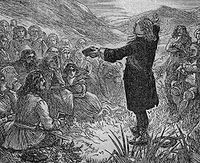- Conventicles Act 1670
-


A Covenanters Conventicle.[1] The Conventicles Act 1670 is an Act of the Parliament of England (22 Car. II. c. 1) with the long title "An Act to prevent and suppress Seditious Conventicles." [2] The Act imposed a fine on any person who attended a conventicle (any religious assembly other than the Church of England) of five shillings for the first offence and ten shillings for a second offence. Any preacher or person who allowed their house to be used as a meeting house for such an assembly could be fined 20 shillings and 40 shillings for a second offence. [3]
References
- ^ Lawson, Rev. R. (1885). Maybole Past and Present. Pub. J. & R. Parlane. P. 49.
- ^ 'Charles II, 1670: An Act to prevent and suppress Seditious Conventicles.' Statutes of the Realm: volume 5: 1628-80 (1819), pp. 648-51, accessed 8 March 2007.
- ^ 'Book 1, Ch. 15: From the Fire to the death of Charles II' A New History of London: Including Westminster and Southwark (1773), pp. 230-55, accessed 7 March 2007.
United Kingdom legislation Pre-Parliamentary legislation Acts of Parliament by states preceding
the Kingdom of Great BritainActs of the Parliament of England to 1483 · 1485–1601 · 1603–1641 · Interregnum (1642–1660) · 1660–1699 · 1700–1706
Acts of the Parliament of Scotland
Acts of the Parliament of Ireland to 1700 · 1701–1800Acts of Parliament of the
Kingdom of Great Britain1707–1719 · 1720–1739 · 1740–1759 · 1760–1779 · 1780–1800
Acts of Parliament of the United Kingdom of
Great Britain and Ireland and the United
Kingdom of Great Britain and Northern IrelandChurch of England Measures Legislation of devolved institutions Acts of the Scottish Parliament
Acts and Measures of the Welsh Assembly
Acts of the Northern Ireland Assembly / of the Northern Ireland Parliament
Orders in Council for Northern IrelandSecondary legislation Categories:- Acts of the Parliament of England concerning religion
- 1670 in England
- 1670 in law
- 17th-century laws in Christianity
- United Kingdom law stubs
Wikimedia Foundation. 2010.

